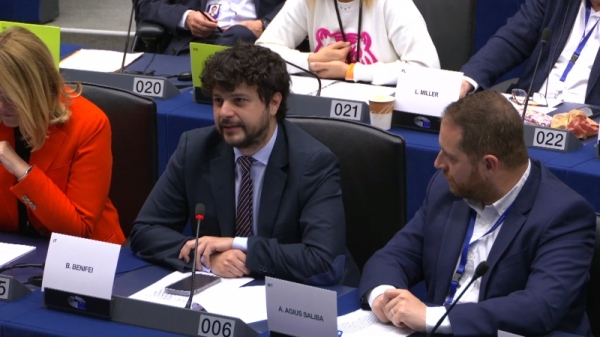AI Act moves ahead in EU Parliament with key committee vote

The European Parliament’s leading parliamentary committees have green-lighted the AI Act in a vote on Thursday (11 May), paving the way for plenary adoption in mid-June.
The AI Act is a flagship legislation to regulate Artificial Intelligence based on its potential to cause harm. On Thursday, the Parliament’s Civil Liberties and Internal Market committees jointly adopted the text by large majority.
The next step is the plenary adoption, with 14 June as a tentative date. After MEPs formalise their position, the proposal will enter the last stage of the legislative process, kicking off the negotiations with the EU Council and Commission, so-called trilogues.
“We are on the verge of building a real landmark legislation for the digital landscape, not only for Europe but also for the entire world,” Brando Benifei, one of the file’s co-rapporteurs, told his peers ahead of the vote.

AI Act: EU Parliament fine-tunes text ahead of key committee vote
EU lawmakers have been finalising the text of the AI regulation ahead of the vote in the leading parliamentary committees on Thursday (11 May).
The AI Act is a landmark legislative proposal to regulate Artificial Intelligence based on its potential to …
AI definition
Defining Artificial Intelligence is a critical aspect of the legislation as it defines its scope. Conservative MEPs obtained aligning the definition with that of the Organisation for Economic Cooperation and Development (OECD), a club of 38 wealthy countries.
“‘Artificial intelligence system’ (AI system) means a machine-based system designed to operate with varying levels of autonomy and that can, for explicit or implicit objectives, generate outputs such as predictions, recommendations, or decisions, that influence physical or virtual environments.”
Remarkably, the OECD is already thinking about tweaking its AI definition. Therefore, EU lawmakers adjusted the wording to anticipate the organisation’s future wording.

EU lawmakers set to settle on OECD definition for Artificial Intelligence
The European Parliament agreed to close a critical contentious point of the AI Act by adopting the definition used by the OECD. Most other definitions have also been agreed upon, with new measures like a right to explanation also on the table of EU lawmakers.
Prohibited practices
The AI Act bans specific applications like manipulative techniques and social scoring, which are considered to pose an unacceptable risk. The list of these prohibited practices was significantly extended upon the insistence of left-to-centre MEPs.
The ban was extended to AI models for biometric categorisation, predictive policing, and scrapping facial images for building databases. Emotion recognition software is forbidden in law enforcement, border management, workplace and education.
Biometric identification systems, permitted initially in specific situations like kidnapping or terrorist attacks, were a more controversial point. The Parliament had a majority for a complete ban, despite the conservative European People’s Party resisting it until the very last minute.

AI Act: EU Parliament walking fine line on banned practices
Members of the European Parliament closed several critical parts of the AI regulation at a political meeting on Thursday (13 April), but the prohibited uses of AI could potentially divide the house.
General Purpose AI
The original version of the AI Act did not include systems without a specific purpose in its scope. The fast-paced success of ChatGPT and other large language models pushed EU lawmakers to scratch their heads on how to best regulate this type of AI. The result was a tiered approach.
The AI rulebook will not cover General Purpose AI (GPAI) systems by default. The bulk of the obligations will fall on the economic operators that integrate these systems into an application considered at high-risk.
However, the GPAI providers would have to support the downstream operators’ compliance by providing all the relevant information and documentation on the AI model.
More stringent requirements are proposed for foundation models, powerful general-purposeAI systems like Stable Diffusion that can power other AI applications. Obligations cover risk management, data governance and the level of robustness of the foundation model, to be vetted by independent experts.
The top tier is for generative AI models like ChatGPT, which would have to disclose whenever a text is AI-generated and provide a detailed summary of the training data covered by copyright law.

AI Act: MEPs close in on rules for general purpose AI, foundation models
The European Parliament is set to propose stricter rules for foundation models like ChatGPT and distinguish them from general purpose AI, according to an advanced compromise text seen by EURACTIV.
High-risk categorisation
The regulation introduces a stricter regime for high-risk AI applications. Initially, high-risk was determined based on a list of critical areas and use cases under Annex III.
However, MEPs removed this automatism, adding as an extra layer that to be classified as high-risk, an AI system would also have to pose a significant risk to harm people’s health, safety, or fundamental rights.
If AI systems fall under Annex III, but the providers deem there is no significant risk, they would have to notify the relevant authority, which will have three months to object. The providers will be able to launch their AI solution in the meantime, but misclassifications will be subject to penalties.
Annex III has also been significantly amended, making the wording more precise in critical infrastructure, education, employment and access to essential services. The fields of law enforcement, migration control and administration of justice were expanded.
The recommender systems of social media platforms designated as very large online platforms under the Digital Services Act were added.

AI Act: EU Parliament’s crunch time on high-risk categorisation, prohibited practices
The European Parliament’s co-rapporteurs proposed compromise amendments to the list of high-risk AI applications, banned uses and concept definitions.
EU lawmakers Brando Benifei and Dragoș Tudorache are striving to close the negotiations on the Artificial Intelligence Act in the coming days. …
High-risk obligations
The European Parliament’s text made the obligations for high-risk AI providers much more prescriptive, notably in risk management, data governance, technical documentation and record keeping.
A completely new requirement was introduced for users of high-risk AI solutions to conduct a fundamental rights impact assessment considering aspects such as the potential negative impact on marginalised groups and the environment.

AI Act: MEPs want fundamental rights assessments, obligations for high-risk users
The European Parliament’s co-rapporteurs circulated new compromise amendments to the ArtificiaI Intelligence (AI) Act proposing how to carry out fundamental rights impact assessments and other obligations for users of high-risk systems.
The new compromise was circulated on Monday (9 January) to …
Governance and enforcement
Among EU lawmakers, there was a consensus to ensure a centralisation element to the enforcement architecture, especially for cross-border cases. Co-rapporteur Dragoș Tudorache proposed setting up an AI Office, a new body that would fall little short of an EU agency.
During the negotiations, the AI Office’s tasks have been significantly slashed due to the lack of room for manoeuvre on the EU budget. Thus, the AI Office was limited to a supporting role, such as providing guidance and coordinating joint investigations.
By contrast, the Commission was tasked with settling disputes among national authorities on dangerous AI systems.

AI Act: MEPs extend ban on social scoring, reduce AI Office role
The ban on social scoring has been extended to private companies, regulatory sandboxes could be used to demonstrate compliance, and the AI Office’s role has been downsized in a whopping new set of compromise amendments to the upcoming AI Act.
On …
Read more with EURACTIV




